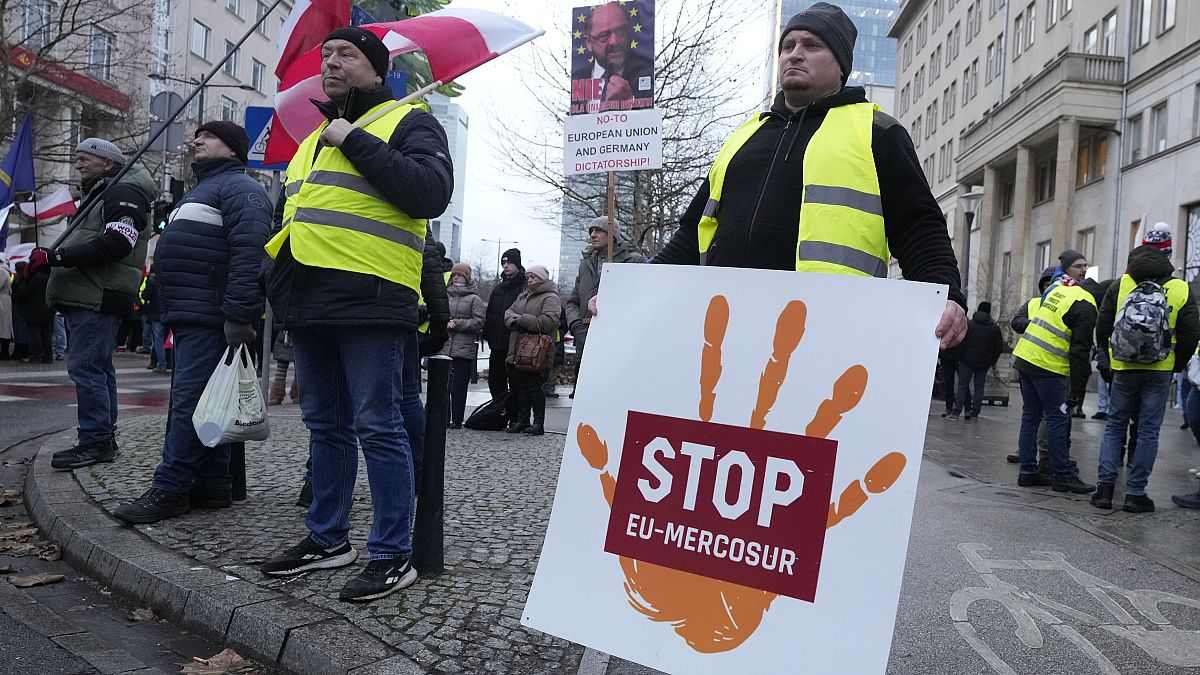The European Commission has proposed financial support for farmers negatively impacted by the EU-Mercosur trade agreement – but the safety net would only be triggered in the ‘worst-case scenario’ and the EU executive says it won’t be needed.
Farmers fear the as-yet unratified deal with the Latin American bloc comprising Brazil, Argentina, Paraguay, Uruguay, and Bolivia could disrupt European markets, particularly in sensitive sectors such as beef and poultry.
The EU has promised to introduce safeguards, partly to win over countries like France and Poland, where farmers hold considerable political sway. But recent communications about these safeguards have sown confusion.
At a hearing with MEPs last week, EU Trade Commissioner Maroš Šefčovič mentioned a potential “fund” to support farmers if Mercosur harms European agriculture. He described it as a “reserve worth at least €1 billion”, comparing it to a warranty – a mechanism that only comes into play if something goes wrong.
The ambiguity over whether it’s a “fund” or a “reserve” has unsettled the agricultural sector. A fund implies guaranteed money for farmers, while a reserve would only be disbursed in response to specific crises.
To complicate matters further, a Commission representative denied the existence of a compensation fund during a technical meeting with EU ambassadors earlier this week, calling it an “additional reserve”.
“Whether you refer to this as a fund or as a reserve, the intention is for this to be a sort of insurance policy for our farmers and rural areas,” a Commission spokesperson told Euronews.
So what could this insurance policy be, exactly?
Reserve v. Fund
What we know so far is that this money will be allocated by the Commission in the context of the proposal for the EU’s long-term budget – a clear hint that it will be part of the Common Agricultural Policy (CAP), the EU’s farming subsidies programme.
In the CAP, the distinction between a reserve and a fund is significant: a fund provides proactive financial support to boost sectors or prevent crises, while a reserve is reactive – money released only if a crisis occurs.
For example, the EU’s subsidies programme includes two primary funds: the European Agricultural Guarantee Fund (EAGF), which allocates €291 billion for income support schemes; and the Rural Development Fund, with a €95.5 billion budget under the current seven-year framework.
Additionally, the CAP includes an annual agricultural reserve of €450 million, which is activated only in exceptional circumstances. The proposed Mercosur reserve appears to follow this model – and may even supplement the existing agricultural reserve.
Safety net for farmers
Despite the confusion over the terms, Commission officials have stressed that this reserve is purely precautionary.
“A pot of money would be available in the worst-case scenario,” a spokesperson said, emphasising that the Commission does not expect to have to use it.
Officials are confident the safeguards built into the Mercosur agreement will protect the EU agricultural sector. These include close monitoring of market developments and strict limits on the maximum market share of sensitive agrifood imports from Mercosur countries.
“We trust that the agreement will work correctly and not cause market disruption. Still, we want to guarantee that there will be no negative repercussions for farmers and rural areas,” Commissioner Šefčovič assured MEPs.
The EU has used similar measures before. In 2020, the €5.5 billion Brexit Adjustment Reserve (BAR) was established to mitigate economic disruptions from the UK’s withdrawal.
However, delays and vague criteria for accessing BAR funds have frustrated some farmers, such as sugar beet producers, who claim they have yet to receive support.
“Despite losing exports to the UK, EU growers have never seen this money,” the EU sugarbeet growers lobby CIBE said in a social media post.
With the Mercosur reserve, the Commission hopes to avoid similar issues and reassure Europe’s farmers that they can count on support should the trade deal cause them unintended difficulties.
Read the full article here


